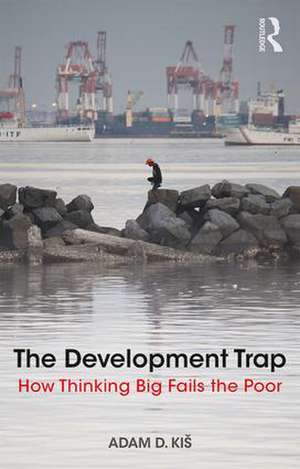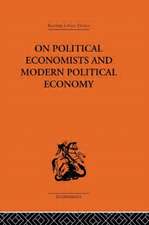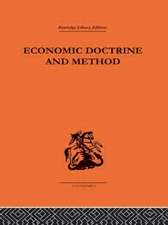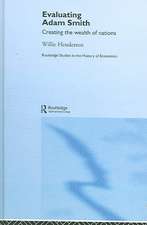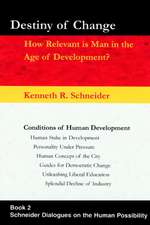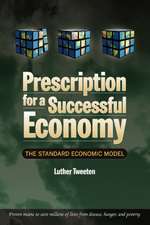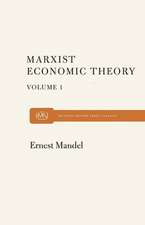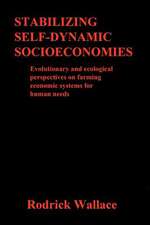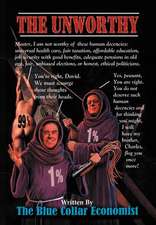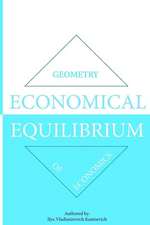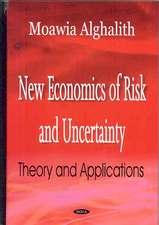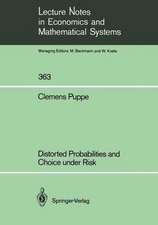The Development Trap: How Thinking Big Fails the Poor
Autor Adam D. Kišen Limba Engleză Paperback – 8 mar 2018
Using rigorous scholarship illustrated with vivid storytelling and personal anecdotes from fighting against poverty in the field, The Development Trap argues that we need to make progress against poverty on the micro, rather than the macro scale. Instead of shooting for a single overarching end of poverty, our goals must be modest and reachable.
| Toate formatele și edițiile | Preț | Express |
|---|---|---|
| Paperback (1) | 198.27 lei 3-5 săpt. | +8.68 lei 7-13 zile |
| Taylor & Francis – 8 mar 2018 | 198.27 lei 3-5 săpt. | +8.68 lei 7-13 zile |
| Hardback (1) | 1049.99 lei 6-8 săpt. | |
| Taylor & Francis – 6 mar 2018 | 1049.99 lei 6-8 săpt. |
Preț: 198.27 lei
Nou
Puncte Express: 297
Preț estimativ în valută:
37.94€ • 39.75$ • 31.36£
37.94€ • 39.75$ • 31.36£
Carte disponibilă
Livrare economică 22 martie-05 aprilie
Livrare express 08-14 martie pentru 18.67 lei
Preluare comenzi: 021 569.72.76
Specificații
ISBN-13: 9781138574564
ISBN-10: 1138574562
Pagini: 190
Ilustrații: 8 Line drawings, black and white; 1 Halftones, black and white; 4 Tables, black and white; 9 Illustrations, black and white
Dimensiuni: 138 x 216 x 15 mm
Greutate: 0.23 kg
Ediția:1
Editura: Taylor & Francis
Colecția Routledge
Locul publicării:Oxford, United Kingdom
ISBN-10: 1138574562
Pagini: 190
Ilustrații: 8 Line drawings, black and white; 1 Halftones, black and white; 4 Tables, black and white; 9 Illustrations, black and white
Dimensiuni: 138 x 216 x 15 mm
Greutate: 0.23 kg
Ediția:1
Editura: Taylor & Francis
Colecția Routledge
Locul publicării:Oxford, United Kingdom
Public țintă
General, Postgraduate, Professional, and UndergraduateCuprins
Section 1: The Case Against Poverty Eradication 1. The Development Delusion 2. Semantics 3. Culture 4. Confounders 5. The Perversion of Idealism Section 2: The Case for Continued Engagement in Fighting Poverty 6. Fighting the Good Fight 7. The Pursuit of Happiness 8. The Ends of poverty
Notă biografică
Adam D. Kiš is an Assistant Professor of Anthropology in the International Studies Program at Burman University in Canada. He holds a PhD in anthropology from the University of Florida, USA. He has lived and worked in the United States, Benin, Guinea, Sao Tome and Principe, Madagascar, the Philippines and Canada.
Recenzii
"Anyone thinking about a career in international development needs to read this book - a dose of reality therapy about what can go wrong and how to make things go right. If program directors take the lessons of this book seriously, the results of their efforts will be less costly and more effective - a win for everyone." — H. Russell Bernard, Research Professor, Arizona State University, USA
"Finally those of us who have been looking for a balanced approach to international development as a field of practice and study have a book we can confidently refer our colleagues and students to that offers a truly realistic assessment of the possibilities and challenges involved in this line of work." — Øystein S. LaBianca, Professor, Andrews University, USA
"This thought-provoking book offers a sound analysis of development and its misconceptions. The proposition that development has failed is hard to accept but arguments presented are undisputable. Feeling inspired to keep development uncomplicated and yet pioneering and people-focused are key takeaways for me." — Denison Grellmann, CEO, Adventist Development and Relief Agency (ADRA), New Zealand
"The Development Trap is a must read for those in development work. As someone who has worked in humanitarian aid, Adam Kiš brings a breath of fresh air to the question 'can we end poverty altogether?' No donor should continue to give hand outs before reading this practical and insightful book." — Luc Sabot, former Country Director for the Adventist Development and Relief Agency (ADRA) Laos, Canada
"The author has lived among the poorest of the poor in Africa and elsewhere and brings a fresh, middle ground, alternative perspective to arguments that have become increasingly polemical. This is the book to read to understand economic and social development in all its complexities, and it is clearly and engagingly written." — Edward C. Green, formerly Senior Research Scientist, Harvard University, USA
"Finally those of us who have been looking for a balanced approach to international development as a field of practice and study have a book we can confidently refer our colleagues and students to that offers a truly realistic assessment of the possibilities and challenges involved in this line of work." — Øystein S. LaBianca, Professor, Andrews University, USA
"This thought-provoking book offers a sound analysis of development and its misconceptions. The proposition that development has failed is hard to accept but arguments presented are undisputable. Feeling inspired to keep development uncomplicated and yet pioneering and people-focused are key takeaways for me." — Denison Grellmann, CEO, Adventist Development and Relief Agency (ADRA), New Zealand
"The Development Trap is a must read for those in development work. As someone who has worked in humanitarian aid, Adam Kiš brings a breath of fresh air to the question 'can we end poverty altogether?' No donor should continue to give hand outs before reading this practical and insightful book." — Luc Sabot, former Country Director for the Adventist Development and Relief Agency (ADRA) Laos, Canada
"The author has lived among the poorest of the poor in Africa and elsewhere and brings a fresh, middle ground, alternative perspective to arguments that have become increasingly polemical. This is the book to read to understand economic and social development in all its complexities, and it is clearly and engagingly written." — Edward C. Green, formerly Senior Research Scientist, Harvard University, USA
Descriere
The author sets out a middle ground, arguing that poverty will never be entirely eradicated, but that we can still achieve meaningful change on a smaller scale. It will be perfect for international development professionals, students and scholars, and for those with a general interest in the future of aid and development.
